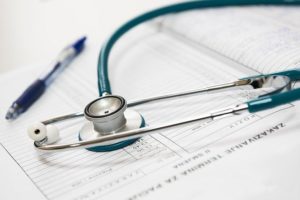
Terminology – Organs
A list of general body organs(die Körperorgane). The list is searchable Related content
here are some basic phrases and terms to help you on your next general doctor’s visit.
A typical conversation to make an appointment will be as follows:
You must report at reception. A typical phrase would be – Hallo mein Name ist Frau xxx, ich habe um 10 Uhr einen Termin.
You will most like be asked to wait in the waiting room (das Wartezimmer) – warten Sie bitte im Wartezimmer
You will be called by name when the doctor can see you.
Most doctors can understand basic English so if you really struggle ask if you can describe your symptoms in English.
Have a look at the Terminology pages to help you prepare to describe your body parts in Germany.
If you are referred to a specialist (Facharzt) you will be given a Überweisung.
If you need medicine (Medikamente), you will be given a Rezept which you must take to the Pharmacy (Apotheke).
You do not have to tell your manager or HR department what is wrong with you when you are on sick leave.
You have to let your employer know that you are ill, even if you do not to the doctor.
If you receive a sicknote, (Krankschreibung/Arbeitsunfähigkeitsbescheinigung/Gelbe Zettel) you have to submit it to your employer as soon as possible, please also refer to your company’s rules. As of 2023 your doctor will send a digital sick note (elektronischen Arbeitsunfähigkeitsbescheinigun or eAU) to your Medical insurance. Your employer will have access to this data. – currently only for public health insurance, private soon to follow.
You can let them know “ich bin krank geschrieben, und werde am 22. Juli wieder im Büro sein”
Tip – Always refer to your employment contract for your company rules and regulations.
“Grundsätzlich gilt gemäß Gesetz, dass bei einer Krankheit, die voraussichtlich länger als drei Tage dauert, eine ärztliche Bescheinigung vorgelegt werden muss, um der Nachweispflicht entsprechend nachzukommen. Diese sollte spätestens am vierten Tag der Krankheit beim Arbeitgeber liegen. Wie Sie dies bewerkstelligen, obliegt Ihnen. In diesem Zusammenhang sind die Kalender- und nicht die Arbeitstage entscheidend.” – Arbeitsrechte
In Germany, you are entitled to 6 weeks of paid sick leave
Disclaimer – The information on this page is based on personal experiences and research, we are not qualified to give any legal advice and we do not accept any form of liability resulting from reading this article.

A list of general body organs(die Körperorgane). The list is searchable Related content

A list of general body part (die Korperteile). The list is searchable Related Content

When I first came to Germany, I was fortunate to still frequently travel back to SA, so I did all my check-ups there and tried
You must be logged in to post a comment.